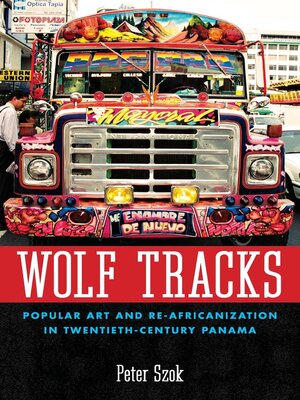Wolf Tracks
ebook ∣ Popular Art and Re-Africanization in Twentieth-Century Panama · Caribbean Studies Series
By Peter Szok

Sign up to save your library
With an OverDrive account, you can save your favorite libraries for at-a-glance information about availability. Find out more about OverDrive accounts.
Find this title in Libby, the library reading app by OverDrive.



Search for a digital library with this title
Title found at these libraries:
| Library Name | Distance |
|---|---|
| Loading... |
How did a country whose past is intertwined with African slavery ignore its cultural legacies through much of history? And how did Blackness recently break through this amnesia so that nearly a third of Panamanians now self-identify as Afro-descendants? Wolf Tracks explores these and other related questions through the lens of Panamanian street culture.
Popular art is a masculine and working-class genre, pioneered by self-taught, commercial painters, whose high-toned designs, vibrant portraits, and landscapes appear in cantinas, barbershops, and restaurants. The red devil buses are popular art's most visible manifestation. The old school buses are imported from the United States and provide public transportation in Colón and Panama City. Their owners hire the artists to attract customers with eye-catching depictions of singers and actors, brassy phrases, and exotic panoramas. The red devils boast powerful stereo systems and dominate their surroundings with their loud music, screeching brakes, horns, sirens, whistles, and mufflers.
Wolf Tracks analyzes the origins of these practices, tying them to rebellious, Afro-American festival traditions, and to the rumba craze of the mid-twentieth century. While the intellectual class fled from modernization and constructed a romantic and mestizo (European-Indigenous) vision of Panama, popular artists enthusiastically embraced the new influences to project a dynamic, on-the-ground sense of Blackness. Wolf Tracks includes biographies of dozens of painters, as well as detailed discussions of reggae, soccer, and other markers of a growing Black identity.
Popular art is a masculine and working-class genre, pioneered by self-taught, commercial painters, whose high-toned designs, vibrant portraits, and landscapes appear in cantinas, barbershops, and restaurants. The red devil buses are popular art's most visible manifestation. The old school buses are imported from the United States and provide public transportation in Colón and Panama City. Their owners hire the artists to attract customers with eye-catching depictions of singers and actors, brassy phrases, and exotic panoramas. The red devils boast powerful stereo systems and dominate their surroundings with their loud music, screeching brakes, horns, sirens, whistles, and mufflers.
Wolf Tracks analyzes the origins of these practices, tying them to rebellious, Afro-American festival traditions, and to the rumba craze of the mid-twentieth century. While the intellectual class fled from modernization and constructed a romantic and mestizo (European-Indigenous) vision of Panama, popular artists enthusiastically embraced the new influences to project a dynamic, on-the-ground sense of Blackness. Wolf Tracks includes biographies of dozens of painters, as well as detailed discussions of reggae, soccer, and other markers of a growing Black identity.







